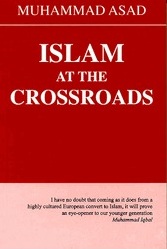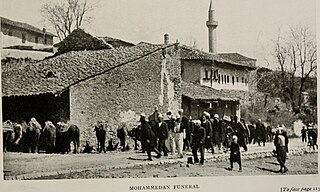 W
WVerse (ayah) 256 of Al-Baqara is a very famous verse in the Islamic scripture, the Quran. The verse includes the phrase that "there is no compulsion in religion". Immediately after making this statement, the Quran offers a rationale for it: Since the revelation has, through explanation, clarification, and repetition, clearly distinguished the path of guidance from the path of misguidance, it is now up to people to choose the one or the other path. This verse comes right after the Throne Verse.
 W
WAn-Nisa 4:34 is the 34th verse in the fourth chapter of the Quran. This verse discusses the husband's role as protector and maintainer of his wife and how he should deal with disloyalty on her part. Scholars vastly differ on the implications of this verse, with many Muslim apologists arguing that it serves as a deterrent from anger-based domestic violence; whereas some Muslims, such as Islamic feminist groups, argue that the text is a justification for domestic violence. The translation of the verse is also subject to debate among Muslim scholars, which can read 'strike them [wives]' or '(lightly) strike them' or 'beat them' or 'scourge them', depending on the translator. Furthermore, as that said in a hadith transmitted by Abu Huraira, slapping someone across their face was forbidden.
 W
WAn-Nur is the 24th chapter (sūrah) of the Quran with 64 verses (āyāt).
 W
WBahar-e-Shariat (1939) is an encyclopedia of Islamic fiqh (jurisprudence), according to the Hanafi school. Spreading over 20 volumes, Seventeen of its volumes were written by Amjad Ali Aazmi, a disciple of Ahmed Raza Khan. The final three books were compiled by his disciples after his death. The book is written in simple Urdu and has 11624 topics.
 W
WThe Cairo Declaration on Human Rights in Islam (CDHRI) is a declaration of the member states of the Organisation of Islamic Cooperation (OIC) adopted in Cairo, Egypt, on 5 August 1990, which provides an overview on the Islamic perspective on human rights, and affirms Islamic sharia as its sole source. CDHRI declares its purpose to be "general guidance for Member States [of the OIC] in the field of human rights".
 W
WCapital punishment in Islam was traditionally regulated by Sharia, the religious law in Islam that comes from the Hadith that lists the sayings and practices of Muhammad. Crimes according to the Sharia laws which could result in capital punishment include murder, rape, adultery, etc. Capital punishment is in use in many Muslim-majority countries, where it is utilised for such as crimes as murder, rape, apostasy, witchcraft, and publishing pornography.
 W
WFatawa 'Alamgiri also known as Al-Fatawa al-'Alamgiriyya or Al-Fatawa al-Hindiyya is a sharia based compilation on statecraft, general ethics, military strategy, economic policy, justice and punishment, that served as the law and principal regulating body of the Mughal Empire, during the reign of the Mughal emperor Muhammad Muhiuddin Aurangzeb Alamgir. Heralded as "the greatest digest of Muslim law made in India", the compilation has been widely regarded to be one of the most well organised works in the field of Islamic jurisprudence (fiqh).
 W
WThe Fifteenth Amendment bill to the Constitution of Pakistan was passed by National Assembly of Pakistan on 28 August 1998. It was then moved to the Senate, where it was never passed.
 W
WGender segregation in Islamic law, custom, law and traditions refers to the practices and requirements in Islamic countries and communities for the separation of men and boys from women and girls in social and other settings. Scholars differ as to whether the Qur'an requires gender segregation, and, if so, the hadith that require it. There are diverging opinions among experts in Islamic theology concerning gender segregation.
 W
WThe Guardianship of the Islamic Jurist, also called the Governance of the Jurist, is a post-Occultation theory in Twelver Shia Islam which holds that Islam gives a faqīh custodianship over people. Ulama supporting the theory disagree over how encompassing custodianship should be.
 W
WIslam at the Crossroads is a book written by Muhammad Asad. The book originally published in Delhi and Lahore in 1934, and was later reprinted by Dar Al-Andulas in 1982 with an additional note by the author.
 W
WThe Islamic concept of sovereignty differs from the western principles of international custom and law established by the Treaty of Westphalia. An important element of this is the Ummah — the community of Muslims as a whole. Devout Muslims consider that there is no division between religion and politics and so government should be based upon the Qur'an, following the word of God in a unified way, as in the first Caliphate.
 W
WThere exist a number of perspectives on the relationship of Islam and democracy among Islamic political theorists, the general Muslim public, and Western authors.
 W
WIslamic dietary laws are dietary laws that Muslims follow. Islamic jurisprudence specifies which foods are halāl and which are harām. The dietary laws are found in the Quran, the holy book of Islam, as well as in collections of traditions attributed to Islamic prophet Muhammad.
 W
WFunerals in Islam follow fairly specific rites, though they are subject to regional interpretation and variation in custom. In all cases, however, sharia calls for burial of the body as soon as possible, preceded by a simple ritual involving bathing and shrouding the body, followed by salah (prayer). Burial is usually within 24 hours of death to protect the living from any sanitary issues, except in the case of a person killed in battle or when foul play is suspected; in those cases it is important to determine the cause of death before burial. Cremation of the body is strictly forbidden in Islam.
 W
WIslamic Law and International Law: Peaceful Settlement of Disputes is a 2020 book by the American political scientist Emilia Justyna Powell, in which the author examines the presence of Islamic law-related arguments in the jurisprudence of the International Court of Justice.
 W
WThe legal system of Saudi Arabia is based on Sharia, Islamic law derived from the Qur'an and the Sunnah of the Islamic prophet Muhammad. The sources of Sharia also include Islamic scholarly consensus developed after Muhammad's death. Its interpretation by judges in Saudi Arabia is influenced by the medieval texts of the literalist Hanbali school of Islamic jurisprudence. Uniquely in the Muslim world, Sharia has been adopted by Saudi Arabia in an uncodified form. This, and the lack of judicial precedent, has resulted in considerable uncertainty in the scope and content of the country's laws. The government therefore announced its intention to codify Sharia in 2010, and, in 2018, a sourcebook of legal principles and precedents was published by the Saudi government. Sharia has also been supplemented by regulations issued by royal decree covering modern issues such as intellectual property and corporate law. Nevertheless, Sharia remains the primary source of law, especially in areas such as criminal, family, commercial and contract law, and the Qur'an and the Sunnah are declared to be the country's constitution. In the areas of land and energy law the extensive proprietorial rights of the Saudi state constitute a significant feature.
 W
WACT! for America, founded in 2007, is a U.S.-based anti-Muslim advocacy group dedicated to combating what it describes as "the threat of radical Islam" to the safety of Americans and to democracy.
 W
WIslamic military jurisprudence refers to what has been accepted in Sharia and Fiqh by Ulama as the correct Islamic manner, expected to be obeyed by Muslims, in times of war. Some scholars and Muslim religious figures describe armed struggle based on Islamic principles as the Lesser jihad.
 W
WAn-Nisa' is the fourth chapter (sūrah) of the Quran, with 176 verses (āyāt). The title derives from the numerous references to women throughout the chapter, including verse 34 and verses 127-130.
 W
WThe Verse of Obedience is verse 59 of Surah An-Nisa in the Quran and known as Uli al-Amr Verse. The verse orders the believers to obey Allah, to obey the prophet and those vested with authority. In Shi'ite sources, this verse is introduced as one of the proofs for the Ismah (infallibility) and Imamah of Ali and other Imams.
 W
WThe Palestine Emergency Law is an emergency law defined by Palestine in Article No. 110 of the amended Basic Law of 2003 AD, which is a law regulating the state of emergency, which is an exceptional system defined in time and space declared by the government, to meet emergency and unusual conditions that threaten the country or a part of it, through urgent measures and unusual methods under conditions Specific and until the threat is gone. A text that emphasizes the necessity and importance of defining the situation in space and time is always contained in international legislation related to this subject, and it is adhered to with strict conditions, to limit the abuse that customary, executive or administrative authorities may exercise against this situation.
 W
WPolitical Islam is any interpretation of Islam as a source of political identity and action. It can refer to a wide range of individuals and/or groups who advocate the formation of state and society according to their understanding of Islamic principles. It may also refer to use of Islam as a source of political positions and concepts. Political Islam represents one aspect of the Islamic revival that began in the 20th century, and not all forms of political activity by Muslims are discussed under the rubric of political Islam. Most academic authors use the term Islamism to describe the same phenomenon or use the two terms interchangeably. There are new attempts to distinguish between Islamism as religiously based political movements and political Islam as a national modern understandings of Islam shared by secular and Islamist actors.
 W
WHardline Salafist Muslims patrolled the streets of Wuppertal, a city in the west of Germany, to "influence and recruit young people", according to local police. Dressed in bright orange reflective vests with "Shariah Police" printed on the back, the male patrollers loitered around discotheques and gambling houses, telling passers-by to refrain from gambling and alcohol. Wuppertal's police have pressed charges.
 W
WThis Law of Ours and Other Essays is a book written by Muhammad Asad, first published by Dar al-Andalus, Gibraltar in 1987. The book is a collection of Asad's writings, lectures and radio broadcasts—some written as far back as the 1940s—which aims to clarify some of the confusion in the Muslim Ummah about the scope and practical implications of Islamic law.
 W
WThe verse of Ikmāl al-Dīn or Ikmāl, for short, is verse Q5:3 of Islam's holy book, the Quran. The literal translation of the title is the verse of perfection of the religion. The Ikmal verse begins and ends with dietary instructions for Muslims but also contains two controversial sentences: The first sentence announces that disbelievers have now been disappointed [from subverting Islam]. The second sentence is known as the Ikmal sentence and declares that Islam, as a religion, has now been perfected. The interpretation of the Ikmal sentence is foundational in Islam and explains the chasm between the Sunni and Shia sects of Islam.
 W
WThe Verse of Loan is verse 282 in chapter Al-Baqara (Q2:282). This verse is the longest verse at the longest chapter in Quran. The concept of borrowing was explained in the verse.
 W
WThe Verse of Purification is verse Q33:33 of the Quran. This verse has a special significance in Shia Islam whose adherents accept the infallibility of Ahl al Kisa. The latter consists of the Islamic prophet, Muhammad, his daughter, Fatimah, her husband, Ali, and their two sons, Hasan and Husayn. Sunni Islam rejects this viewpoint but there is no consensus among Sunni scholars about the interpretation of this verse, as detailed below. Independent of the purification verse, Shia and Sunni agree upon the infallibility of Muhammad, although the interpretation of infallibility varies.
 W
WA waqf, also known as hubous (حُبوس) or mortmain property is an inalienable charitable endowment under Islamic law. It typically involves donating a building, plot of land or other assets for Muslim religious or charitable purposes with no intention of reclaiming the assets. A charitable trust may hold the donated assets. The person making such dedication is known as a waqif. In Ottoman Turkish law, and later under the British Mandate of Palestine, a waqf was defined as usufruct state land from which the state revenues are assured to pious foundations. Although the waqf system depended on several hadiths and presented elements similar to practices from pre-Islamic cultures, it seems that the specific full-fledged Islamic legal form of endowment called waqf dates from the 9th century AD.